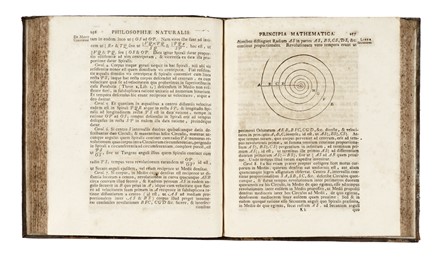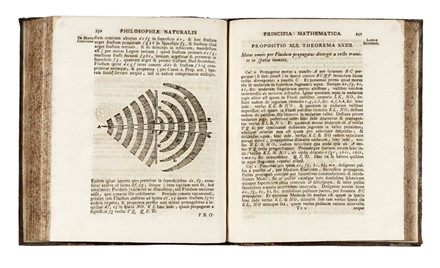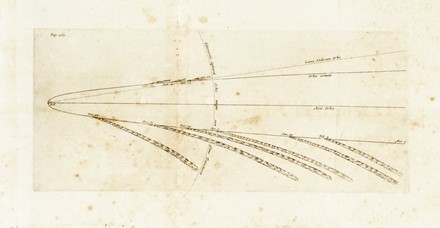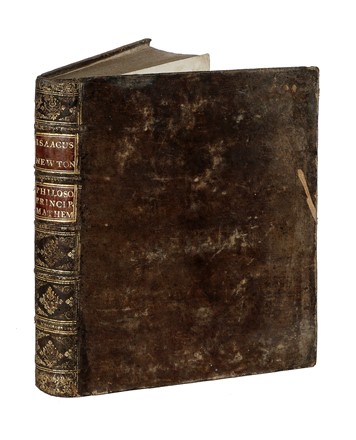Auction 31 / Graphics & Books
tue 26 OCTOBER - fri 29 OCTOBER 2021
Lot 1408
Newton Isaac
Fisica, Scienze tecniche e matematiche
Philosophiae naturalis principia mathematica.
Amstaelodami: Sumptibus societatis, 1714.
In-4° (mm 240x195). Pagine [28], 484, [8] + 1 carta di tavola calcografica fuori testo più volte ripiegata raffigurante l'orbis cometae e rilegata in fine. Frontespizio in inchiostro rosso e nero con vignetta incisa in rame, numerosissimi diagrammi e illustrazioni incisi in legno nel testo. Piccolo foro di tarlo nel margine inferiore delle prime 20 carte (sempre senza perdite) tracce d'uso al frontespizio Sporadiche carte lievemente brunite, con bruniture più concentrate in alcuni fascicoli, alcune fioriture alla tavola. Per il resto ottima copia, marginosa e ben conservata. Legatura in piena pelle con titoli in oro su tassello al dorso. Decorazioni dorate ai comparti, tagli spruzzati. Mancanze lungo le unghiature, piatti lievemente lisi.
Rara prima edizione di Amsterdam, ristampa della seconda edizione inglese edita a Cambridge nel 1713; Cfr. Babson, Supplement 4: «The first Amsterdam reprint of the second edition of the Principia is a fine example of bookmaking»; Hall 43, 87; Jorink-Maas, 27 e passim; McKitterick II, 107 «The new edition, a page for page resetting on paper inferior to that from Cambridge, and with a new set of woodcut figures, appeared in Amsterdam in 1714»; la seconda edizione inglese era stata stampata in un numero così esiguo di copie che un editore tedesco realizzò questa edizione rivale per soddisfare la domanda del mercato; e fu questa edizione pirata olandese ad essere recensita dal Journal des savants nel 1715 e dal Journal de Trévoux nel 1718 (Shank, 122). I Principia Mathematica di Newton, nella prima edizione, sono considerati «the greatest work in the history of science. Copernicus, Galileo and Kepler had certainly shown the way; but where they described the phenomena they observed, Newton explained the underlying universal laws. The "Principia" provided the great synthesis of the cosmos, proving finally its physical unity. Newton showed that the important and dramatic aspects of nature that were subject to the universal law of graviation could be explained, in the mathematical terms, within a single physical theory. [...] [...] The second edition of "Principia" was not published until 1713». «Following the pioneer researches of Galileo in the study of motion, and its Mathematical analysis and the important contributions of Descartes (vedi lotto 442) [...], the scientific revolution of the seventeenth century culminated in the massive achievements of Newton in dynamics and gravitational astronomy». (cfr. PMM 161).

















